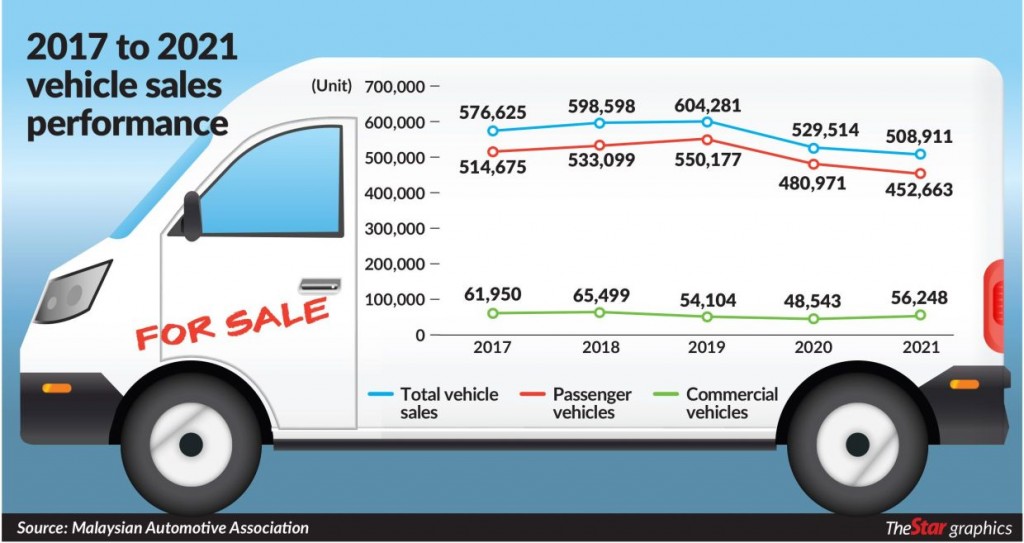Underpinned by the post-pandemic global economic rebound as well as better business operating conditions and incentives on the local front, the Malaysian Automotive Association (MAA) is projecting vehicle sales in 2022 to grow 18% year-on-year to 600,000 units.
MAA president Datuk Aishah Ahmad said consumer spending is expected to revive in tandem with the country’s economic recovery, while the introduction of new models at more competitive prices will also spur interest.
“The continuation of the sales tax exemption for passenger vehicles into 2022, companies ramping up production and deliveries of vehicles to fulfill backlog, together with new orders, will be the main contributors in improving sales of new motor vehicles,” she said during a virtual press conference yesterday.
Aishah added that the central bank’s decision to maintain the benchmark overnight policy rate at 1.75% will also help to spur economic recovery.
“This may help to stimulate domestic spending, especially for big-ticket items like new cars.”
In spite of the upbeat outlook, Aishah cautioned that car companies could still face lingering uncertainties and potential challenges ahead.
“The automotive industry may continue to face pandemic-related disruption challenges and supply chain issues such as a new wave of Covid-19 infections, shortage of semiconductors chips, rising cost of freight or even uncertainties in our domestic political scene, which may affect the country’s economic growth momentum and in turn the sales of new vehicles.
“However, it is unlikely these disruptions will cause major upheaval in the economy, given the experiences learnt in the handling of the Covid-19 crisis over the past two years.”
Aishah added that 2022 will also see plenty of car companies having aggressive promotional campaigns to push sales and to recover lost market share from last year.
Additionally, Aishah said the introduction of new models, including electric vehicles (EVs) at more competitive prices, will help sustain buying interest.

“Since the government announced the exemption of excise and import duties, there has been a lot of interest for EVs.
“The government is also ramping up all the policies to ensure there is more emphasis on EVs right now.”
To support the development of a domestic EV industry, the government announced during the tabling of Budget 2022 in October last year that it would provide full exemptions on import and excise duties and sales tax, as well as road tax (up to 100%) for EVs.
Individual income tax relief of up to RM2,500 will also be given on the costs of buying, installing, leasing or repayments of EV charging facilities.
Additionally, the government also announced in Budget 2022 that the sales and services tax exemption, which is 100% for locally assembled or completely-knocked-down passenger vehicles and 50% for imported or completely-built-up passenger cars, has been extended till June 30, 2022.
Aishah said the tax exemption on EVs has stimulated interests of original equipment manufacturers to invest in Malaysia.
“I am also told that the government is very serious about ensuring that EVs will be the future type of vehicles in Malaysia.”
Aishah said a total of 274 units of EVs were sold in Malaysia last year.
“For 2022, I believe the sales number will be a lot higher, especially in light of the tax exemption.”
MIDF Research in a report yesterday noted that new EV model introductions have been picking up pace.
“Since the introduction of the duty exemptions for EVs in Budget 2022, new EV model introductions have picked up, which is a positive in building up demand for EVs and the supporting infrastructure.
“Within the EV space, we think opportunities will be mainly in brand and model expansion within the next 12 months, given the lack of domestic representation and limited offerings currently.”
Total vehicle sales dropped 4% year-on-year to 508,911 units in 2021, as various movement restrictions caused by the Covid-19 pandemic last year hampered business operations for months.
The last time annual automotive sales were lower than last year’s numbers was in 2007, when the total industry volume (TIV) hit 487,176 units.
In spite of the abysmal sales performance last year, the contraction was still lesser than the TIV contraction recorded in 2020, which was at 12.4%.
A total of 529,514 vehicles were sold in 2020.
On the whole, Ashah said 2021’s TIV performance was still a commendable achievement, given the tremendous challenges faced by the industry last year.
“In fact, it was slightly higher than our forecast of 500,000 units that we announced in July last year,” she said.










